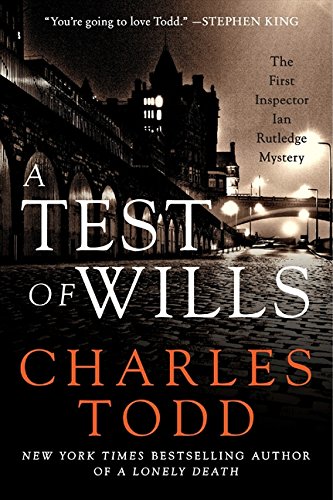
In 1918, the combat-related illness known today as post-traumatic stress disorder was called “shell shock.” Its sufferers were more likely to be stigmatized than treated with compassion. In Charles Todd’s literary novel, A Test of Wills, Inspector Ian Rutledge, after four years of trench warfare in France and several months in a sanitarium for the treatment of shell shock, returns to Scotland Yard. Among his symptoms, he’s haunted by an echo in his brain—the voice of Corporal Hamish MacLeod, a man who died in the trenches, along with part of Rutledge’s soul. Hamish sometimes acts as a conscience or consultant, but he’s often a torturer who attacks Rutledge when he wearies.
When the Warwickshire constabulary requests the assistance of the Metropolitan Police in the case of a politically sensitive murder investigation, the ambitious but paranoid Scotland Yard Superintendent Bowles, aware of Rutledge’s delicate condition, dispatches Rutledge with the hope that the case will end his career.
The Warwickshire constabulary suspects that Captain Mark Wilton, ace fighter pilot, winner of the Victoria Cross, and a personal friend of both the King and the Prince of Wales, may have murdered a member of the local gentry. Should Wilton come to trial, he would embarrass the Crown. Should he walk free, the gossips would suspect a cover-up. To avoid negative publicity, the local police pass responsibility to Scotland Yard. Only an expert and experienced investigator, at the top of his game, can solve this riddle and dodge career-ending repercussions.
Barely able to function, Rutledge seemingly rides to his professional death. He’s lost faith in everything, including his intuition. His only possible escapes from Hamish are sleep and death.
“Shell shock” in its many forms meets Rutledge in Warwickshire—an alcoholic veteran whose mind remains on the battlefield, a war widow numbed by the burden of loneliness, a post-traumatic mute child witness to a bloody murder, all share shades of PTSD symptoms. Rejected by the community, they hold the key to the murderer’s identity, but no one believes them.
The Orlando Sentinel says of A Test of Wills, “A first novel that speaks out, urgently and compassionately, for a long-dead generation…A Test of Wills is both a meticulously wrought puzzle and a harrowing psychological drama about a man’s struggle to raise himself from the dead.”
Charles Todd, through his protagonist, explores the depth of every character to the point that the reader walks in their skin, weighs their hearts, and judges their guilt or innocence. Readers stalk the byways of this quaint rural community, visit the church, the inn and the house of ill-repute. They meet Dr. Warren, the ideal family physician who never rests as he ministers to his community. In contrast, Mavers, who disturbs the peace with his political rants and freely insults prominent town’s people, stands as the most likely “scapegoat” to hang for the murder, but for a seemingly iron-clad alibi. C. Tarrant, an extraordinarily popular artist in London, lives quietly in the countryside, allowing metropolitan art critics to believe she’s a man. She conceals other secrets, as well.
The author not only rewards his readers with an intensely compelling story, but pleases with his lyricism: “Rutledge had just returned to the Yard after covering himself with mud and glory in the trenches of France…” and “Rutledge looked into the eyes like black plums in a pudding, and flinched at what he read there, a torment much like his own…” and “…he’d discovered in the trenches of France that hell itself was not so frightening as the darkest corners of the human mind…”
Ian Rutledge reminds the reader of the profound spiritual and emotional damage of war that endures long after the battered landscape heals. He alerts us to the presence of souls about us, trauma victims who nurse deep scars inflicted by second and third hand shrapnel. And yet, “the War to End All Wars” is just the beginning.
A Test of Wills, by Charles Todd is the first volume of the Ian Rutledge Mystery Series.
Thanks to Lisa Nicholas for her editorial assistance. Contact Lisa for you editorial needs.